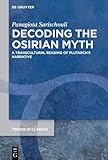Decoding the Osirian Myth : A Transcultural Reading of Plutarch’s Narrative / Panagiota Sarischouli.
Material type: TextSeries: Trends in Classics - Supplementary Volumes ; 163Publisher: Berlin ; Boston : De Gruyter, [2024]Copyright date: 2024Description: 1 online resource (XXXV, 517 p.)Content type:
TextSeries: Trends in Classics - Supplementary Volumes ; 163Publisher: Berlin ; Boston : De Gruyter, [2024]Copyright date: 2024Description: 1 online resource (XXXV, 517 p.)Content type: - 9783111435022
- 9783111435213
- 9783111435138
- online - DeGruyter
- Issued also in print.
| Item type | Current library | Call number | URL | Status | Notes | Barcode | |
|---|---|---|---|---|---|---|---|
 eBook
eBook
|
Biblioteca "Angelicum" Pont. Univ. S.Tommaso d'Aquino Nuvola online | online - DeGruyter (Browse shelf(Opens below)) | Online access | Not for loan (Accesso limitato) | Accesso per gli utenti autorizzati / Access for authorized users | (dgr)9783111435138 |
Frontmatter -- Acknowledgments -- Contents -- Abbreviations -- Illustrations -- Maps -- Egyptian Chronology -- Introduction -- Part I: Plutarch -- 1 Plutarch’s Egyptian Treatise -- 2 The Osirian Myth in Plutarch’s De Iside et Osiride -- Part II: Religious, Mythological and Magical Traditions -- 3 Egyptian Religious Tradition and Plutarch’s Narrative -- 4 ‘Dying and Rising’ Gods in Near Eastern and Greek Traditions -- 5 The Osirian Myth in Graeco-Egyptian Magic -- Bibliography -- Index of Passages Cited -- Subject Index
restricted access online access with authorization star
http://purl.org/coar/access_right/c_16ec
The earliest written references to the Osirian myth-complex appeared already in the Pyramid Text spells (c. 2400–2300 BCE). The most complete exposition of this ancient Egyptian myth is, however, found in the Greek treatise On Isis and Osiris, in which the 2nd-century CE Platonist Plutarch utilises Egyptian mythology to advocate his philosophical ideas concerning the divine and the nature of the cosmos. This book aims at “decoding” Plutarch’s narrative of the Osirian myth, linking his claims to the existing Egyptian and Greek parallels. It thus analyses a multitude of mythic and religious traditions from a transcultural perspective, exploring the relation of the Pharaonic features of the Osirian divinities to the features they had acquired in Ptolemaic and Roman times, interpreting the Egyptian myth within the overall framework of parallel mythologies from other cultures, and examining whether the brief mythic stories (historiolae) recited in Late Egyptian ritual texts can be deployed to enrich the context of certain obscure episodes in Plutarch’s account of the myth. The book will be of great interest not only to scholars and students of Plutarch and later Middle Platonism, but also to Egyptologists. Due to its thematic variety and scope, this publication will also appeal to a wider array of readers (specialists and non-specialists alike) interested in religious syncretism, interreligious connections, and the challenge of multiculturalism from Hellenistic times until Late Antiquity.
Issued also in print.
Mode of access: Internet via World Wide Web.
In English.
Description based on online resource; title from PDF title page (publisher's Web site, viewed 20. Nov 2024)


